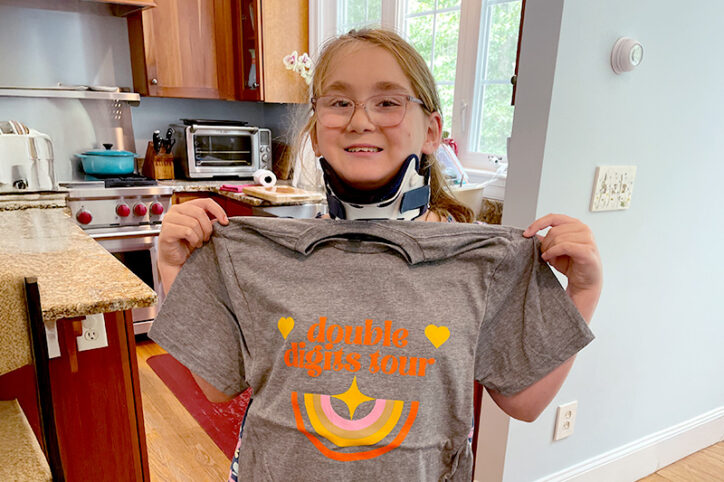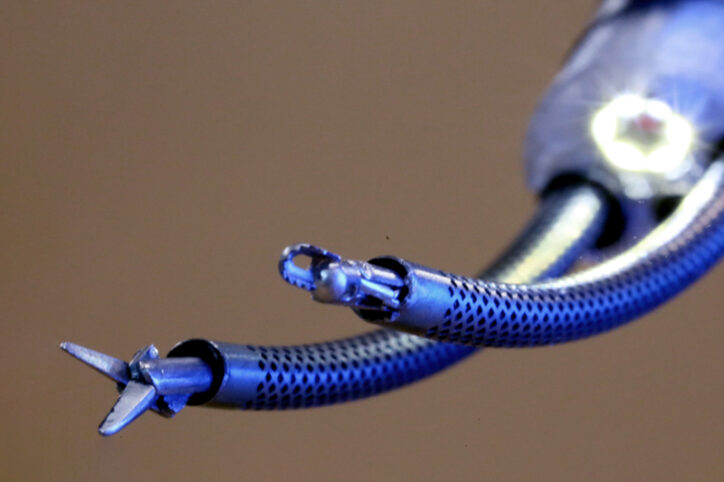Archive for neurosurgery
What orthopedic trauma surgeons wish more parents knew about lawnmower injuries
Summer is full of delights: lemonade, ice cream, and fresh-cut grass to name a few. Unfortunately, the warmer months can also come with a type of injury that takes many families by surprise. Mowing the lawn may seem perfectly normal and safe. However, the blades that cut the grass can also do serious damage to ... Read More about What orthopedic trauma surgeons wish more parents knew about lawnmower injuries
A fall from a swing uncovers a rare cervical spine condition: Charlotte’s story
If it were any other year, Charlotte Gillis would have celebrated her 10th birthday in mid-July with a big party. But in June 2024, a fall from a swing had left her temporarily paralyzed. Though her mobility returned within a few hours, she was still in a neck brace, still wobbly on her feet, and ... Read More about A fall from a swing uncovers a rare cervical spine condition: Charlotte’s story
MRI could reduce the mystery of brachial plexus injuries in infants
About one in 1,000 children are born with brachial plexus birth injury (BPBI), upper extremity weakness or paralysis resulting from trauma to the brachial plexus nerves during childbirth. Most children with BPBI recover with observation and minimally invasive care, but about 30 percent have injuries severe enough to lead to long-term impairment. Thanks to recent ... Read More about MRI could reduce the mystery of brachial plexus injuries in infants
For Fiadh: Pushing the envelope to treat drug-resistant epilepsy
Fiadh is a bubbly and empathetic 4-year-old. And if you ask her parents, Elaine and Dario, she’s also mischievous and wild. “She knows when she shouldn’t be doing something,” Elaine says. “Then she gives you a look, giggles, and does it anyway.” Fiadh’s tenacity likely comes from her mother, which is a good thing. After ... Read More about For Fiadh: Pushing the envelope to treat drug-resistant epilepsy
Tagged: eeg, epilepsy, neurosurgery, seizures
In cases of pediatric cervical spine instability, two attending surgeons are better than one
Cervical spine instability (caused by congenital deformity, trauma, or a tumor) can affect children in a number of ways: from chronic headaches to bowel dysfunction to severe mobility limitations. In many cases, misaligned vertebrae compress the spinal cord and surrounding nerves, causing neurological issues, which, if left untreated, can lead to long-term disability. Common indications ... Read More about In cases of pediatric cervical spine instability, two attending surgeons are better than one
Finding epilepsy hotspots before surgery: A faster, non-invasive approach
Neurosurgery for patients with drug-resistant epilepsy requires locating the precise brain areas that are generating the seizures. Typically, patients undergo 7 to 10 days of invasive intracranial EEG monitoring, with electrodes surgically implanted inside the brain through one or more skull openings to capture seizure activity as it happens. Eleonora Tamilia, PhD, directs the Epilepsy ... Read More about Finding epilepsy hotspots before surgery: A faster, non-invasive approach
Tagged: artificial intelligence, eeg, epilepsy, neurosurgery, research
Care for a prince: One family’s inspiring journey for encephalocele repair
To hear Peter and Eunice of Kenya tell the story of their son, Prince, is to hear about the power of hope, the best of humanity, and the interconnectivity that makes the world a small place after all. Hope in the hopeless In March 2022, Eunice was about five months into her pregnancy when a ... Read More about Care for a prince: One family’s inspiring journey for encephalocele repair
Tagged: brain health, craniofacial, encephalocele, international, neurosurgery
Broken signals: Things you may not know about nerve injury
When Dr. Andrea Bauer talks about nerve injuries, she talks about phone cords. A damaged phone cord transmits staticky or broken sounds, or no sound at all. Similarly, peripheral nerve injuries (injuries that affect the arms, hands, legs, and feet) disrupt signals to and from the brain, causing numbness, loss of sensation, and lost function. ... Read More about Broken signals: Things you may not know about nerve injury
From pain to purpose: An update on Dylan’s traumatic brain injury
We first introduced you to Dylan four years ago, when a traumatic brain injury led him to the Department of Neurosurgery for care and instilled in him a love of medicine. We caught up with the college senior this summer to see where life has taken him since he started an internship with the team ... Read More about From pain to purpose: An update on Dylan’s traumatic brain injury
This two-handed robot goes deep into the brain
Robots have become common partners in the OR, enabling surgeons to operate through small incisions and manipulate tools endoscopically, avoiding invasive open surgery. But in neurosurgery, robots’ capabilities have been more limited. While they can assist with relatively simple procedures like inserting an electrode, more invasive and complex operations like removing a tumor still require ... Read More about This two-handed robot goes deep into the brain
Tagged: brain tumor, neurosurgery, robotics, surgery











